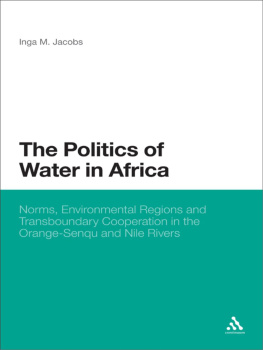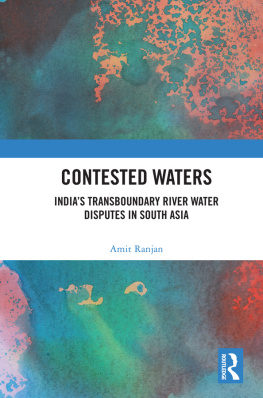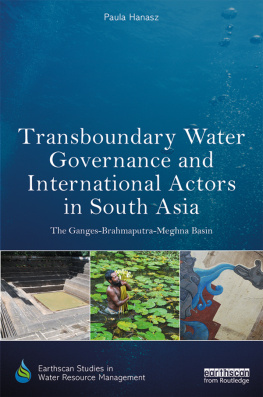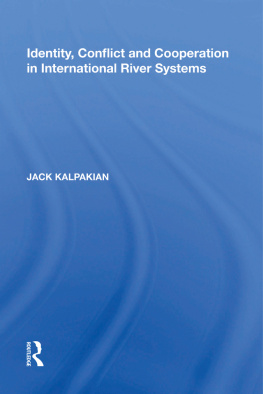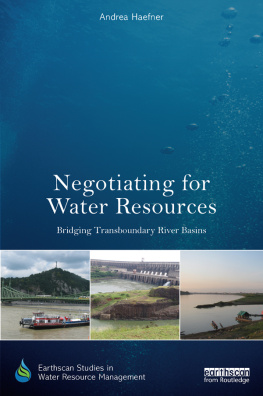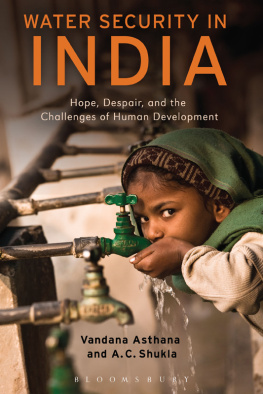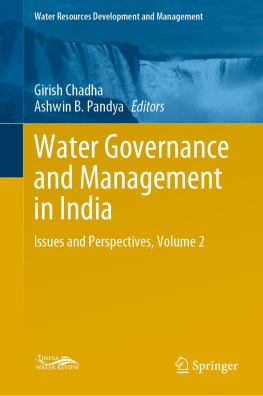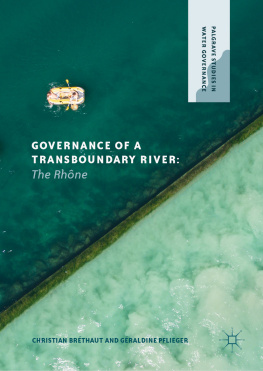First published 2010
by Routledge
912915 Tolstoy House, 1517 Tolstoy Marg, New Delhi 110 001
Simultaneously published in the UK
by Routledge
2 Park Square, Milton Park, Abingdon, Oxon, OX14 4RN
Routledge is an imprint of the Taylor & Francis Group, an informa business
Transferred to Digital Printing 2010
2010 N. Shantha Mohan, Sailen Routray and N. Sashikumar
Typeset by
Star Compugraphics Private Limited
D156, Second Floor
Sector 7, Noida 201 301
All rights reserved. No part of this book may be reproduced or utilized in any form or by any electronic, mechanical or other means, now known or hereafter invented, including photocopying and recording, or in any information storage and retrieval system without permission in writing from the publishers.
British Library Cataloguing-in-Publication Data
A catalogue record of this book is available from the British Library
ISBN: 978-0-415-55155-7
River-water sharing, particularly from a transboundary perspective, is embedded in conflicts and disputes that surround fair and equitable access to, and control over common water resources. These conflicts are all-pervasive and may take place between nations, regional states, or competing sectors or users. Within India, majority of the river basins are geographically spread across two or more states, hence resulting in tensions, and at times even violence, at the inter-state and local level. To address these conflicts several national legislations such as the River Boards Act, the Interstate Water Disputes Act and others relating to environment protection, forest conservation, pollution control, etc., have been enacted. Further, the central government is also empowered to take measures to ensure integrated development of inter-state rivers, and establish mechanisms for resolution of conflicts between riparian states. Despite these efforts, they have been largely ineffective in resolving disputes between the contesting states. Many of the problems are due to the fact that there are no acceptable criteria that determine what is fair and equitable in terms of water allocations. More importantly, there is an absence of clear legal and institutional mechanisms to address these problems. Often decisions regarding allocation of water are informed by the dominant discourses of science and technology, with the exclusion of perspectives from other disciplines such as the social sciences and humanities, which are important in capturing the issues that are human in nature. Thus, a multidisciplinary perspective, adopting the tools and approaches specific to the various disciplines, is necessary to identify and evolve criteria for transboundary water sharing. Besides, the existing legal and institutional mechanisms need to be reviewed and alternatives evolved, or the existing ones need to be strengthened, for conflict resolution.
A national consultation on Interstate Transboundary Water Sharing in India was held on 2627 June 2007 at the National Institute of Advanced Studies, Bangalore. This was a platform for the different stakeholders, across political and administrative boundaries, to exchange information and learn from various perspectives on the sharing of river water. The paper presenters were drawn from diverse fields of expertise spanning grassroots leaders, academics, administrators, social scientists, historians, technocrats and gender specialists. The main aim of the dialogue between the stakeholders was to evolve a set of agreeable criteria that states could use to determine equitable allocations and also strengthen, and/or evolve alternate mechanisms for conflict resolution.
This book captures the importance of multidisciplinary approaches in arriving at a more comprehensive understanding of the complexities of inter-state water sharing, and the difficult problems faced by both states and stakeholders in addressing conflicts, particularly at the basin level. The volume is divided into four sections. The introductory chapters locate transboundary water sharing within discussions on the water sector in India. The second and third sections analyse issues from an institutional, legal, historical, cultural and technological perspective. The fourth section presents solutions in addressing problems related to transboundary rivers, and discusses an alternative paradigm for integrated water resource management.
We are grateful to all those committed people; natural and social science academics, policy makers, the government, civil society, farmer groups and community practitioners who participated in the consultation and provided deep insights. The articles have been further strengthened by the comments and suggestions of experts including Dr Roopa, Prof. Chandrakanth, Prof. P.P. Mujumdar, Prof. R.S. Deshpande, Dr D. Nagesh Kumar, Dr Nagaraj and Dr Smita Mishra Panda. We thank the distinguished authors for contributing chapters to the book, as well as for their sustained interest throughout the editorial process. We sincerely thank Dr K. Kasturirangan, Member of Parliament and Director, National Institute of Advanced Studies (NIAS), Bangalore for his continuous support in shaping the dialogue and reiterating the importance of this book for a wider audience. Our thanks to the faculty, staff and doctoral students at NIAS for their contribution in bringing out this book.
A special note of thanks to Global Water Partnership, Stockholm and Dr Mercy Dikito-Wachtmeister for extending financial and technical support, as well as, the representatives of the Global Water PartnershipSouth Asia and the India Water Partnership for their interest and involvement at all stages of the dialogue. Finally, we would like to express our thanks to Ms Omita Goyal, Ms Rimina Mohapatra and Ms Pallavi Narayan from Routledge for their patience and tireless effort in the publication of this volume.
N. Shantha Mohan
Sailen Routray
N. Sashikumar
1
Locating Transboundary Water Sharing in India
N. Shantha Mohan
Introduction
The sharing of rivers across political boundaries is an area of both contention and conflict, be it at the international, national, regional or local levels. Conflicts over water have steadily increased in number due to the various reasons of population growth, rapid industrialization, consumerism, pollution, environmental degradation, inequities in the access to and use of water, poor governance and complications arising out of managing multiple uses across multiple users. The intensity of these conflicts has also increased where the water has been a scarce commodity and a diminishing resource. The increasing pressures on the existing availability of water have created a crisis of unprecedented proportions (Barker


